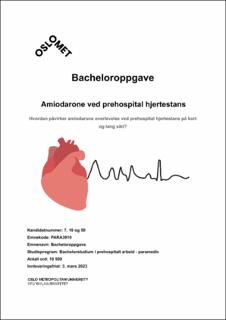| dc.contributor.advisor | Hetman, Fredrik | |
| dc.contributor.author | Vatne, Mabel Irene | |
| dc.contributor.author | Søyland, Una Johanne Roaldseth | |
| dc.contributor.author | Stenerud-Asmyhr, Martin | |
| dc.date.accessioned | 2023-06-15T08:20:32Z | |
| dc.date.available | 2023-06-15T08:20:32Z | |
| dc.date.issued | 2023 | |
| dc.identifier.uri | https://hdl.handle.net/11250/3071498 | |
| dc.description.abstract | Bakgrunn
Hvert år får flere tusen personer i Norge prehospital hjertestans. Amiodarone er et
antiarytmisk legemiddel som ble innført i prosedyren i Europa i år 2000. På den tiden var det
få tilgjengelige forskningsartikler om virkningen til legemiddelet ved hjertestans utenfor
sykehuset. I tillegg er det omdiskutert innad i ambulansetjenesten hvorvidt amiodarone er
hensiktsmessig å prioritere. Formålet med oppgaven er å identifisere amiodarones virkning
ved prehospital hjertestans.
Metode
Metoden som er benyttet i denne oppgaven er en litteraturstudie. Vi har gjort systematiske
søk i ulike databaser for å innhente aktuelle forskningsartikler. Inklusjonskriteriene til søket er
illustrert i et PICO-skjema. I tillegg har vi brukt pensumlitteratur og egne erfaringer fra
prehospital klinikk. Artikler inkludert i oppgaven er kvalitetstestet.
Resultater
Ved administrasjon av amiodarone har pasienten høyere sannsynlighet for overlevelse frem til innleggelse på sykehus og økt sannsynlighet for oppnådd egensirkulasjon (ROSC).
Derimot er overlevelsen over et lenger tidsperspektiv minimalt forbedret ved bruk av
amiodarone. Dersom amiodarone gis innen et optimalt tidsvindu, kan medikamentet ha bedre
effekt på overlevelse og nevrologisk funksjon.
Konklusjon
Ettersom amiodarone gir økt overlevelse og samtidig har få bivirkninger, konkluderer
oppgaven med at amiodarone er hensiktsmessig å gi ved prehospital hjertestans. De
tilgjengelige artiklene om amiodarone gir en begrenset oversikt over effekten. Det kreves
ytterligere forskning på effekten av legemidlet og interaksjonen med adrenalin. | en_US |
| dc.description.abstract | Background
In Norway there are thousands of people that suffer sudden cardiac arrest in an out-of-
hospital setting each year. Amiodarone is an antiarrhythmic drug which was included in the
European protocols in 2000. At that time there was little research available about the
antiarrhythmic drug and its effect in prehospital cardiac arrests. It is also disputed within the
emergency services whether amiodarone should be prioritized. The purpose of this study is
therefore to identify the effect of amiodarone in out of hospital cardiac arrest (OCHA).
Method
The method conducted in this thesis is a literary review. A structured search was performed
in two databases to make a compile of suitable research articles. The included criterias are
illustrated in a PICO-model. In addition we have been using curriculum literature and our own
experiences from the prehospital clinic. All relevant articles were critically appraised before
inclusion.
Results
Administration of amiodarone increases the patient's chance of survival until hospital
admission and increases the probability of returned spontaneous blood circulation (ROSC).
On the other hand, long-term survival was found to be minimally improved with the use of
amiodarone. If amiodarone is administered at an optimal time interval, it could enhance the
effect of survival and neurological function.
Conclusion
This thesis found that administration of amiodarone slightly increases the effect on survival,
with few side effects identified. We therefore concluded that the administration of amiodarone
in patients with OCHA is still the appropriate treatment. However, further research on the
effect of amiodarone is still needed, as there exists only a small portion of available research
with a limited synopsis of the true impact of amiodarone. | en_US |
| dc.rights | Navngivelse-Ikkekommersiell 4.0 Internasjonal | * |
| dc.rights.uri | http://creativecommons.org/licenses/by-nc/4.0/deed.no | * |
| dc.title | Amiodarone ved prehospital hjertestans | en_US |
| dc.type | Bachelor thesis | en_US |

